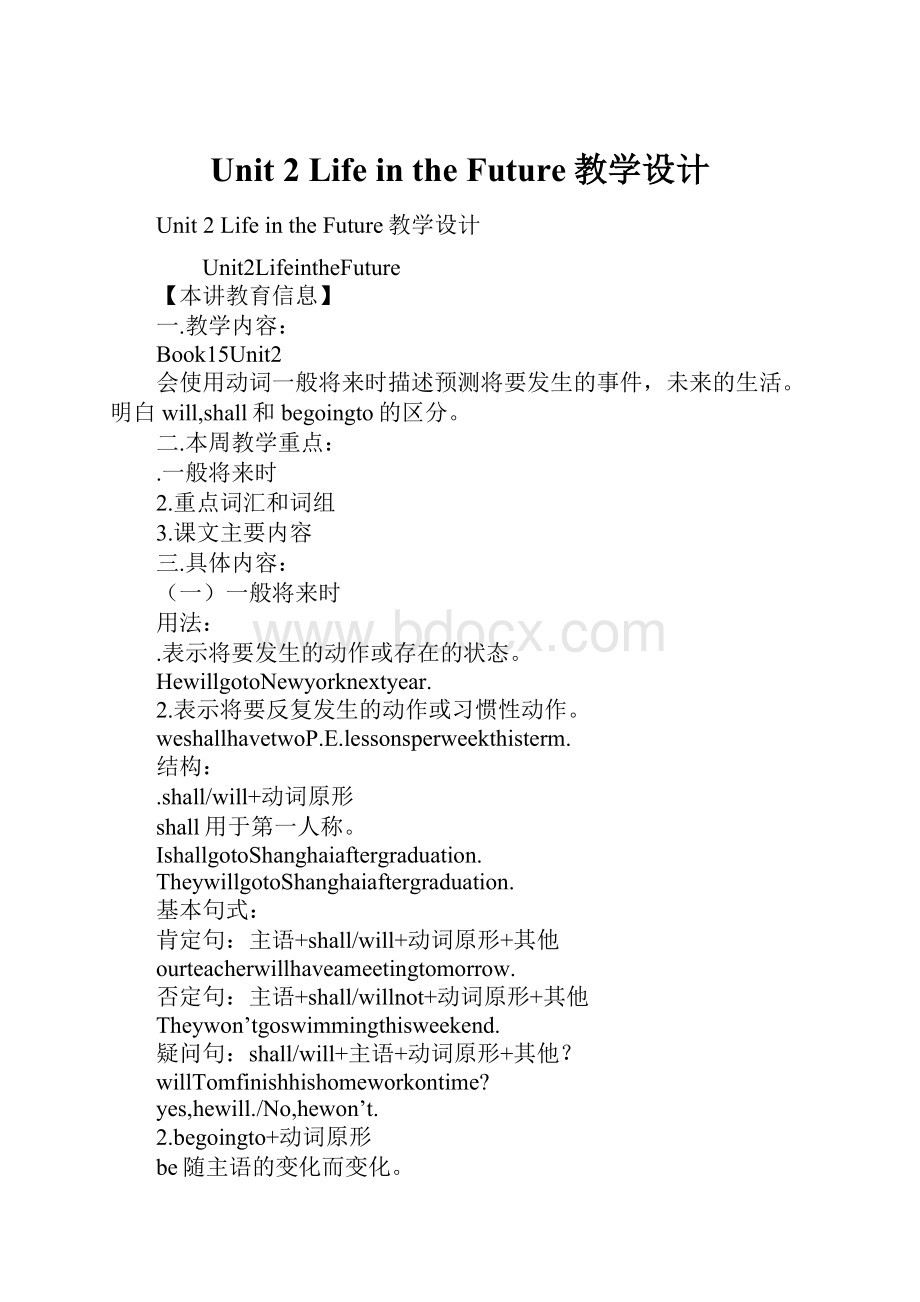Unit 2 Life in the Future教学设计.docx
《Unit 2 Life in the Future教学设计.docx》由会员分享,可在线阅读,更多相关《Unit 2 Life in the Future教学设计.docx(13页珍藏版)》请在冰豆网上搜索。

Unit2LifeintheFuture教学设计
Unit2LifeintheFuture教学设计
Unit2LifeintheFuture
【本讲教育信息】
一.教学内容:
Book15Unit2
会使用动词一般将来时描述预测将要发生的事件,未来的生活。
明白will,shall和begoingto的区分。
二.本周教学重点:
.一般将来时
2.重点词汇和词组
3.课文主要内容
三.具体内容:
(一)一般将来时
用法:
.表示将要发生的动作或存在的状态。
HewillgotoNewyorknextyear.
2.表示将要反复发生的动作或习惯性动作。
weshallhavetwoP.E.lessonsperweekthisterm.
结构:
.shall/will+动词原形
shall用于第一人称。
IshallgotoShanghaiaftergraduation.
TheywillgotoShanghaiaftergraduation.
基本句式:
肯定句:
主语+shall/will+动词原形+其他
ourteacherwillhaveameetingtomorrow.
否定句:
主语+shall/willnot+动词原形+其他
Theywon’tgoswimmingthisweekend.
疑问句:
shall/will+主语+动词原形+其他?
willTomfinishhishomeworkontime?
yes,hewill./No,hewon’t.
2.begoingto+动词原形
be随主语的变化而变化。
Itisgoingtorain.
wearegoingtoswimthisweekend.
基本句式:
肯定句:
主语+begoingto+动词原形+其他
Iamgoingtobuyadictionarythisafternoon.
否定句:
主语+benotgoingto+动词原形+其他
wearenotgoingtostayherelong.
疑问句:
Be+主语+goingto+动词原形+其他
Isitgoingtoraintomorrow?
yes,itis./No,itisn’t.
3.will/shall和begoingto的区分:
)will表示说话人认为,希望或假定要发生的事。
begoingto表示某事物有迹象要发生。
IamsurethattheolympicsinBeijingwillbeverysuccessful.
Lookattheclouds.Itisgoingtorain.
2)will表示意图时不指事先考虑的
begoingto指事先考虑的
Tomorrowwewillhaveanexam,soIamgoingtoreviewthelessons.
3)will不能用于条件状语从句中,而begoingto可以。
Ifyouaregoingtojointheparty,pleasedobetter.
4.therebe
therebe句型常用来表示“某处存在某物”。
)therebe句型的基本句式
肯定句:
therebe+主语+其他
Thereisanapple,abananaandsomepearsinthebag.
否定句:
therebe+not+主语+其他
Therearen’tmanypeopleonthebus.
疑问句:
bethere+主语+其他
Arethereanystudentsontheplayground?
yes,thereare./No,therearen’t.
2)therebe句型的时态
一般现在时:
there+be(am,is,are)+主语+其他
Thereareeightstudentsintheclassroom.
一般过去时:
there+was/were+主语+其他
Therewasagroupofyoungpeopleworkingonthefarmyesterday.
一般将来时:
there+will+be+主语+其他
Therewillbeastrongwindtomorrow.
Therewillnotbeastrongwindtomorrow.
willtherebeastrongwindtomorrow?
yes,therewill./No,therewon’t.
(二)语言点和词组:
(1)However,somethingswillstaythesame.
但是,有些事情是不变的。
stay,系动词,后面接形容词、名词。
e.g.Nothingstaysthesameforlong.什么都不会一成不变。
Thelectureisonhowtostayhealthy.
讲座的话题是如何保持健康。
类似的动词:
look,feel,taste,smell,seem,sound
e.g.Theylookedworriedtoday.他们今天看起来很着急。
Thecakestastegood.蛋糕尝起来很好吃。
Shefelttired.她感觉累了。
Herfaceturnedredwhensheheardit.
当她听到这时,她的脸变红了。
Hervoicesoundedquitesweet.她的声音听起来很甜。
(2)not…anymore=nomore不再……(从次数角度……)
not…anylonger=nolonger
不再……(从时间角度……)
e.g.Shedidn’tcryanymore.她不再哭了。
Theyarenolongeryoung.他们不再年青了。
(3)checkout检查、核查
checkup核对、检验(第十三册)
(4)enoughwater/food/time/money足够的水、
食物、时间、钱
enough修饰形容词、副词,后置
e.g.bigenough
足够大
goodenough
足够好
wellenough足够好
strongenough足够壮
oldenough足够老
(5)becauseof
跟名词或代词
because
跟从句(主语+谓语)
e.g.Shedidn’tgotoschoolyesterdaybecauseofillness.
Shedidn’tgotoschoolyesterdaybecauseshewasill.
(6)leadto通向、引起、导致
Toomuchworkandtoolittlerestwillleadtoillness.
工作太多,休息太少会导致疾病。
Iknowashort-cutleadingtotheparkinglot.
我知道一条通向停车场的近路。
(三)text.
Thepredictionsaboutlifein2050
PeopleandtheInternet
In2050,everyoneintheworldwillhaveapersonalwebpagewiththeirinformationonit.Thesewebpageswillusethefivesenses:
sight,touch,smell,tasteandhearing.Thisway,beforeyoumeetsomeone,youcancheckouthisorherwebpagetolearnabouttheperson.
PeopleandtheEnvironment
In2050,therewon’tbeenoughwaterfortheworld’spopulation.Becauseofthechangesinclimateandincreaseinfarming,someplaceswillbedrierandpeoplewillnotbeabletoproduceenoughfood.Thedemandforwaterwillcreateproblemsbetweencountriesandtheseproblemsmayleadtowar.
worldPopulation
By2050,thepopulationoftheworldwillcometothehighestpoint,probablyaround8.5billionpeople,andthenitwillstarttodecline.Thestructureofthepopulationwillalsochange.mostpeoplewillbeover60yearsold.
课堂练习:
I.按要求改写句子。
.Teenagerswillusecomputerstodoeverything.(一般疑问句)___________________
2.Therewillbemuchpollution.(否定句)________________________________________
3.Therewillstillbeschoolsinthefuture.(一般疑问句,并做否定回答)
_________________________________________
______________________
4.willtherebeflyingcarsinthefuture?
yes,therewill.(肯定句)_____________________
5.Peoplewilltravelbyflyingcarsinthefuture.(提问)__________________________
6.Studentswillhandhomeworktotheirteachersbye-mail.(提问)_____________________
7.Peoplewillstillreadatraditionalbookwhentheywanttoenjoyagoodstory.(提问)
____________________________________________________________________
8.Iwillbeover50yearsoldin2050.(提问)___________________
II.单项选择。
.There
anewTVplayonchannel1thisevening.
A.isgoingtohave
B.willhave
c.isgoingtobe
D.shallbe
2.I’mnotsureifit
tomorrow.Ifit
,wewon’tgototheGreatwall.
A.willsnow,snows
B.willsnow,willsnow
c.snows,snows
D.snows,willsnow
3.—Doyoumindmyopeningthewindow?
It’shothere.
—
.
A.Ithinkyou’rewrong
B.yes,please.
c.ofcoursenot.
D.Idon’tagree.
4.—hallwegotothezootomorrow?
—
.
A.Thankyou
B.Verywell
c.Excuse
D.Goodidea
5.They’llseechangesintravel,
?
A.willthey
B.won’tthey
c.dothey
D.don’tthey
6.Peoplewillbuythings
theInternet.
A.to
B.in
c.on
D.at
7.youlookangry.wouldyoulike
toeat?
A.something
B.anything
c.nothing
D.everything
8.Thereis
onTVtonight.Let’sgoforawalk!
A.somethinginteresting
B.interestingsomething
c.nothinginteresting
D.anythinginteresting
【本讲教育信息】
一.教学内容:
Book15Unit2
能够正确使用动词不定式
二.教学重点和难点:
.动词不定式的使用
2.如何表达同意和反对别人的观点。
3.重点词汇和词组。
三.具体内容:
(一)动词不定式:
结构:
to+动词原形
功能:
动词不定式在句子中可以充当以下六种句子成份。
.作主语
TolearnEnglishwellisverydifficult.
不定式做主语,往往由it作形式主语,不定式移到句子的后面。
ItisdifficulttolearnEnglishwell.
2.作表语
Thedutiesofapostmanaretodeliverlettersandnewspapers.
3.作宾语
Ihopetobecomeateacheraftergraduation.
跟不定式作宾语的常见动词有:
agree,want,refuse,offer,promise,choose,decide,determine,fail,ask,hope,expect,wish,learn,afford,intend,demand,manager,preparebegin,start,forget,remember,like,love,try,need,
…
另外feel,find,think,consider等动词后接不定式做宾语,补语是形容词时,常用it做形式宾语,把不定式后移。
IfinditdifficulttolearnEnglish.
4.作宾语补足语(补充说明宾语)
Iwishhimtowinthegame.
跟不定式做宾补的常见动词有:
advise,wish,prefer,order,teach,get,expect,like,want,ask,encourage,invite,require,tell,help,allow,force
还有一些词后面跟不带to的不定式做宾补:
see,hear,notice,feel,watch,make,let,have,listento…
Hesawthemplayontheplayground.
5.作定语
Therearealotofbookstoread.
不定式与其修饰的词之间一般都有动宾关系,如果不定式是个不及物动词,其后应有介词。
Heisanicepersontoworkwith.
Therearealotofbookstoread.
6.作状语
)表示目的
Topasstheexam,Imustdomybesttostudy.
不定式作目的状语时,否定式必须用inordernottodo,soasnottodo
Let’shurryinordernottobelatefortheclass.
2)表示结果
Shelivedtoseehergrandsongotouniversity.
3)表示原因
Iamgladtoseeyou.
Shewasveryhappytohearthegoodnews.
7.不定式常与疑问词连用构成短语:
Eg:
whattodo/howtodo/wheretogo/
whentostart/whichtobuy
Doyouknowhowtouseacomputer?
(二)如何表达同意和反对
agreement
disagreement
.you’reright.
.Idon’tagree.
2.That’strue.
2.Idon’tthinkso.
3.Iagree.
3.I’mnotsureaboutthat.
4.yes,Ithinkso,too.
4.ofcoursenot.
5.That’strue…..
5.Ithinkyouarewrong.
(三)词组
.apopulartypeofwriting一种流行的文学体裁
2.thinkof认为
3.wantsb.todosth.想让某人做某事
wanttodosth.想做某事
4.decidetodo决定做某事
5.encouragesbtodo鼓励某人做某事
6.suchas…..例如
7.beinterestedin….对……感兴趣
8.asaresult…..结果;由于……结果asaresultof
Eg:
Hewaslateforschoolthismorningasaresultofthesnow.
由于下雪他今早上学迟到了。
Heworkedhard,andasaresult,hegotpromotedquickly.他工作努力,被提拔得很快。
etrue成为现实
Eg:
HesaidthatIwouldbecomeadoctorandithascometruenow.
他说我会成为医生,现在这预言成真了。
0.makesb+rich
使某人……富有
makesbdo使某人……做某事
Eg:
whatyouaredoingwillonlymakethingsworse.
你现在所做的只会使情况更糟。
It’llmakemesohappyifyouacceptit.
你要是接受了,我会十分高兴。
Thebossmadetheworkersworktenhoursaday.
老板强迫工人一天工作十小时。
1.baseon
基于……
以……为基础
2.Englishman
Englishwoman
Frenchman
Englishmen
Englishwomen
Frenchmen
German
Germans
chinese
japanese
Viennese
e/go常用的动词,也常用来组成词组
come
(1)comefrom
来自
(2)comein进来
(3)comeback回来
(4)comedown
下来,降落
(5)comeon
加油
(6)comeafter
跟随
(7)comealong
快点
(8)comeby从旁边走过,经过
(9)comefirst
在前面,名列第一
(10)comehome
回家
(11)comeinto进入
(12)comeover过来,来访
(13)comeacross
(偶然)碰到
(14)comeout出来
(15)cometo达到,合计
(16)comeround来访,到来
(17)comeup
上来,走近
(18)comeandgo来来往往
(19)comeat
攻击,袭击
go
(1)goabout
走来走去
(2)goabroad
出国,出门
(3)goafter追随,跟随
(4)goagainst反对,违背
(5)goahead
前进,进展
(6)goalong
沿着,前进
(7)goaround
四处走动
(8)goback
回去
(9)godown下去,下沉
(10)goeasy仔细一点
(11)goforapicnic
去郊游
(12)gofornothing
徒劳
(13)goforward
前进,进展
(14)gofrom….to
从…变成
(15)gohome
回家
(16)goin
进入
(17)gointo
走近,加入
(18)goon
继续,
(19)goonwith
继续,把…进行下去
(20)goover查看,复习,走过去
(21)gotobed
上床睡觉
(22)gotoschool
上学
(23)gouptotown去城里,进城
(24)gowrong走错路
[课堂练习]
I.单选。
.Atlast,sheaskedtheoldmanifhehad
.
A.somethingtosay
B.everythingtosay
c.somethingsaying
D.everythingsaying
2.Thelittleboydidn’tknowwhat
,sohestoodagainstthewallcrying.
A.do
B.todo
c.doing
D.should
3.–Therearesomanycarsinthestreets.
--yes,moreandmorepeopleare
tobuyprivatecars.
A.ratherrich
B.veryrich
c.enoughrich
D.richenough
4.–Haveyoueverbeentojapan?
--yes,I
japanlastyear.Itwasmyfirstvisittojapan.
A.hasbeento
B.wasgoingto
c.havegoingto
D.wentto
5.Don’t
theTV.Thechildrenaresleeping.
A.turnoff
B.turnon
c.turndown
D.turnover
6.--
isyourfavoritesportsman?
--yaoming.
A.How
B.when
c.who
D.which
7.Theteachertoldus
anylitter.
A.don’tthrow
B.nottothrow
c.notthrow
D.tonotthrow